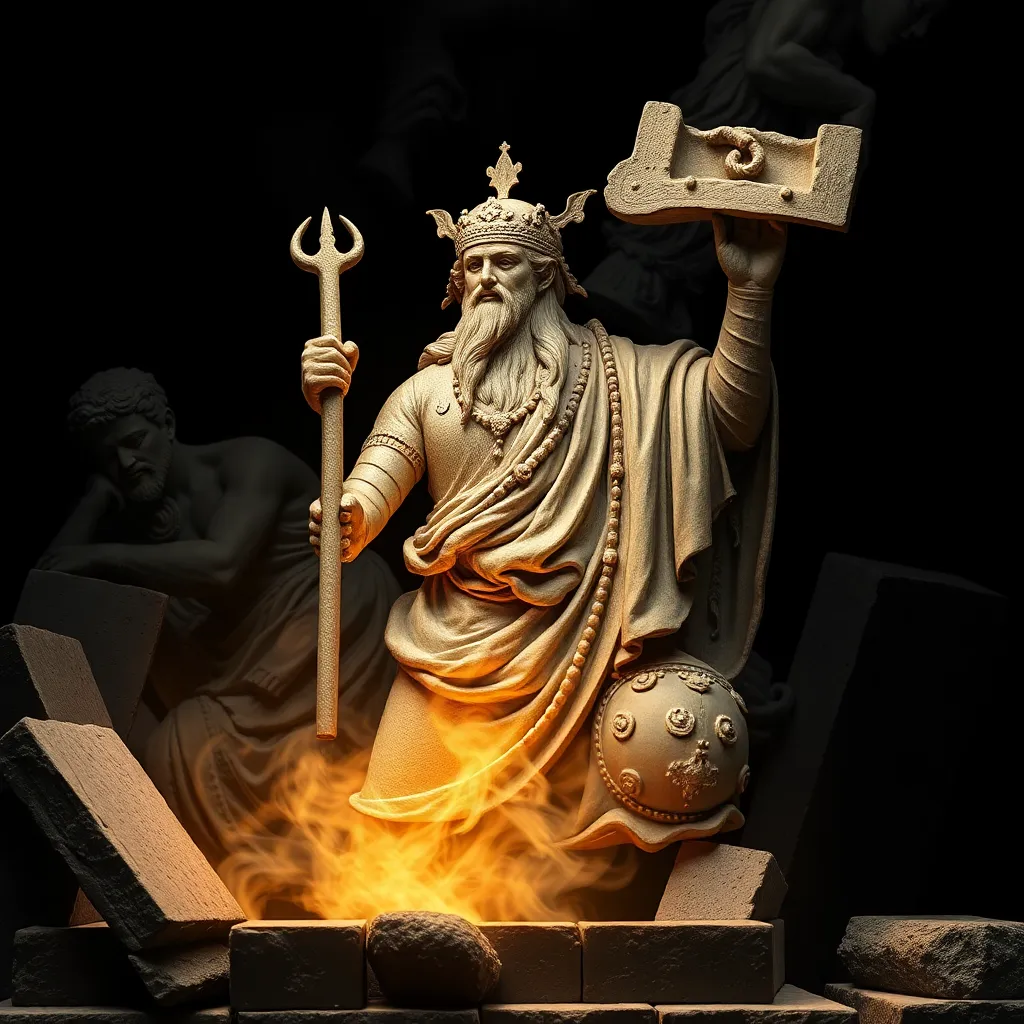Hephaestus and the Nature of Work: Ancient Perspectives on Labor
I. Introduction
Hephaestus, the Greek god of fire and craftsmanship, holds a unique place in mythology as the patron of artisans, blacksmiths, and craftsmen. Unlike the other Olympian gods, Hephaestus is often depicted as physically imperfect, yet his remarkable skills in metalworking and innovation earned him great respect. His narrative reflects the significance of labor in ancient societies, where work was not only a means of survival but also a vital aspect of identity and social structure. This article will explore Hephaestus’s role in mythology, the nature of work in ancient Greece, philosophical perspectives on labor, and the broader implications of these themes in both historical and modern contexts.
II. Hephaestus: The God of Craftsmanship
Hephaestus, also known as Vulcan in Roman mythology, is a multifaceted deity associated with fire, metalworking, and craftsmanship. His myths are rich with tales that highlight his talents and struggles:
- The Birth of Hephaestus: According to legend, Hephaestus was born to Hera alone, without a father. In some versions, he is cast out from Olympus due to his deformity and later returns as a master craftsman.
- His Creations: Hephaestus is credited with creating magnificent items for the gods, including Zeus’s thunderbolts, the armor of Achilles, and the intricate automata that served the gods.
- The Marriage to Aphrodite: His marriage to the goddess of love, Aphrodite, underscores the dichotomy between beauty and labor, as Hephaestus is often depicted as unappealing compared to the other gods.
Hephaestus symbolizes the transformative power of fire and the artistry involved in metalworking, representing skilled labor and craftsmanship in a society that revered these qualities.
III. Labor in Ancient Greek Society
In ancient Greek culture, labor was a fundamental aspect of daily life and social structure. Different types of work were valued differently:
- Agriculture: The backbone of Greek economy, agriculture was considered noble work, often associated with land ownership and wealth.
- Craftsmanship: Skilled artisans were respected for their contributions to society, with crafts like pottery, metallurgy, and weaving being essential for both utility and trade.
- Trade: As a seafaring civilization, trade was vital, and merchants played a crucial role in connecting different cultures and economies.
Laborers, however, faced a complex social hierarchy. Free citizens engaged in intellectual pursuits, while manual laborers, often slaves or lower-class citizens, were viewed with a degree of disdain. Yet, the work of craftsmen like Hephaestus was elevated due to its artistic and innovative nature.
IV. The Philosophical Perspectives on Work
Philosophers such as Aristotle and Plato offered profound insights into the nature of work, emphasizing its relationship with virtue and the ideal worker:
- Aristotle: He believed that work was integral to the good life, positing that engaging in productive work was a form of self-actualization and a path to virtue.
- Plato: In his works, he discussed the division of labor, arguing that individuals should engage in work that aligns with their natural abilities, fostering a harmonious society.
The ideal worker in ancient thought was one who balanced physical labor with intellectual pursuits, embodying the virtues of diligence, skill, and creativity. This ideal resonates with the character of Hephaestus, who, despite his challenges, exemplifies perseverance and ingenuity.
V. Myths and Labor: Lessons from Hephaestus
The narratives surrounding Hephaestus impart valuable lessons about the nature of work:
- The Value of Hard Work: Hephaestus’s relentless dedication to his craft illustrates the rewards of diligence and commitment.
- Creativity vs. Struggle: His story reflects the duality of labor; while it involves hardship, it also leads to creativity and innovation.
- A Model of Perseverance: Despite being shunned by the other gods, Hephaestus’s unwavering spirit serves as an inspiration for overcoming adversity through hard work.
Through these myths, Hephaestus becomes a symbol of resilience, highlighting the significance of labor as a means of personal and communal growth.
VI. Comparisons with Other Cultures
Labor deities exist in many ancient mythologies, reflecting cultural attitudes toward work:
- Egyptian Mythology: Ptah, the god of craftsmen and architects, shares similarities with Hephaestus, emphasizing the divine nature of skilled labor.
- Mesopotamian Mythology: The goddess Nisaba was revered as the goddess of writing and grain, symbolizing the importance of labor in agriculture and literacy.
While the roles of these deities differ, common themes emerge, such as the reverence for skilled labor and the recognition of work as a divine gift, underscoring the universal significance of labor across cultures.
VII. Modern Reflections on Ancient Perspectives
Ancient views on work continue to influence contemporary discussions on labor and ethics:
- Work-Life Balance: The ancient emphasis on the value of work and its relationship with virtue raises questions about the modern pursuit of balance between work and personal life.
- Relevance of Hephaestus: In today’s fast-paced world, Hephaestus embodies the ideals of craftsmanship, innovation, and resilience, reminding us of the importance of dedication to our work.
- Labor Ethics: The historical context of labor ethics encourages us to reflect on the value of work and the dignity of labor in all its forms.
As we navigate the complexities of modern labor, the lessons from Hephaestus and ancient perspectives on work remain profoundly relevant.
VIII. Conclusion
This exploration of Hephaestus and the nature of work reveals the deep-seated significance of labor in ancient Greek society. From the craftsmanship of Hephaestus to the philosophical reflections on work, we uncover a rich tapestry that informs our understanding of labor’s role in identity and culture. The legacy of Hephaestus serves as a reminder of the virtues of hard work, creativity, and perseverance, offering timeless lessons that resonate in our contemporary discussions on labor and ethics. Understanding these historical contexts enriches our appreciation for the diverse expressions of work throughout human civilization.




